- Home
- Muriel Spark
Aiding and Abetting Page 7
Aiding and Abetting Read online
Page 7
True enough, on the road, his pursuers had disappeared. Maria Twickenham’s daughter and Joe Murray, the latter’s name only dimly remembered by Lucan, both of them on the hunt for him. He remembered Maria Twickenham well and felt a great nostalgia for her. If it had been Maria, he might even have revealed himself for twenty minutes. But the daughter . . . And Joe . . . Oh, no, you don’t write any book about me, you don’t. Ambrose had suspected they were having an affair. “I know by the way they look over each other’s shoulders while they’re perusing the press cuttings,” Ambrose had said. “There’s something about lovers and their slop, I always know it.”
And the girl’s name is Lacey, thought Lucan. Very ridiculous. Imagine if I were to put in twelve to fifteen years in a prison cell just to satisfy a girl called Lacey . . .
Anyway he had thrown them at the wedding. Any subsequent enquiries would result in a man called Walker having put in an appearance at the invitation of a man whose name no one remembered.
10
Hildegard had come from Paris by train through the tunnel. She had brought two bulging zip-bags full of documents, a small suitcase, her handbag-briefcase, and what she stood up in. She got a taxi and went to the Manderville Hotel at Queen’s Gate, where she had booked a room. In the taxi she put her watch one hour back. It would be one-fifteen in Paris, it was twelve-fifteen here. In Paris Jean-Pierre would be on the phone trying vainly, as he had tried for the past half hour, to reach her and arrange, as usual, where they would eat lunch. This was the first of the hard and difficult aspects of what Hildegard had set out to do. That was, to disappear without a trace. She had in fact decided on this course without fully realizing it herself, from the day, the hour, the moment she realized that the Lucan claimants knew about her past.
Jean-Pierre would go round to her office. Ring the bell. No reply. Her secretary—Jean-Pierre would ring her up at home, he would go down to the bar and ring her up. But perhaps no—did Jean-Pierre know her secretary’s surname? No, he wouldn’t. At three-thirty a young patient beset with unnecessary fears was due to arrive for a session. Dominique, the secretary-receptionist, would by now have let herself in, and would be puzzled by Hildegard’s nonarrival. “Will you take a seat? Dr. Wolf will be here any minute,” she would say to the girl. In the meantime, four o’clock having struck, she would ring Jean-Pierre’s flat in vain, and then the workshop. “M. Roget? This is Dominique, Dr. Wolf’s receptionist. No, there is no sign of Dr. Wolf. A patient is waiting. Perhaps you should—yes, please come here. Something must have happened. Please come at once.”
They would ring the hospitals, possibly the police stations. Jean-Pierre would send the patient away with his polite apologies. Eventually, perhaps tomorrow, he might make a statement to the police. Dr. Wolf is missing. The police would search her office, the flat she shared with Jean-Pierre. He would be interrogated closely. “When did you last see Mme. Wolf? What was her state of mind?”
He would probably guess her state of mind. He would of course not elaborate on this to the police. He would know she had gone into hiding.
He would wait for a message. About that, she would have to decide. On no account must anyone trace her whereabouts. She had disappeared, perhaps forever. The Lucans would disappear too, go back to where they had come from; Hildegard thought of them as “The Lucans,” without a thought that one of them was probably real, and the other a fake.
In Paris, the course of events that Hildegard had imagined more or less took place, except that Jean-Pierre did not report her disappearance to the police.
She had paid up the rent on her office and given notice. She had left the office furniture, but taken her laptop computer and many of the current files, including the Lucan papers. Dominique checked through, wearing her coat and wool cap, ready to go off into her own life, while Jean-Pierre watched. Dominique looked at all the files that were left. “From my memory,” she said, “and from my appointments book, the files here belong only to patients who had finished their course. The current files are gone.”
“Who were the current clients?”
“Well, there was Walker, there was Lucky Lucan. There was Mrs. Maisie Round, Karl K. Jacobs, and just a minute . . .” She consulted her diary: “There was Dr. Oscar Hertz. Dr. Wolf did like Dr. Hertz so very much. There was Ruth Ciampino. Mrs. William Hane-Busby, also.”
“No French clients?”
“At the moment, none.”
Jean-Pierre was struck by a stab of jealousy. “Who was Dr. Hertz?”
“Dr. Oscar Hertz is a recent widower. He has problems of grief and so on.”
“Do you know the addresses and telephone numbers of all the clients whose files are missing?”
She sat down in her coat and typed, with the aid of her appointments book, what little she knew about the list of names she had just given. “Dr. Wolf spoke seldom about her clients. She was friendly, talkative, very nice to me, but she didn’t say much about the patients who came to consult her. Now, I’ll leave you my office keys. This is the front door. These are the office door—there are two safety locks.”
“I know,” he said. “I have copies of the keys.”
“And the keys to the filing cabinet. The keys to Dr. Wolf’s desk.”
“I don’t have those. Leave them with me.”
“Do you want me to make a statement to the police, M. Roget?”
“There’s no need to tell the police.”
“Would it not be correct?”
“There is no need.”
“No?”
“No.”
“Suppose,” she said, “that Dr. Wolf has met with an accident?”
“I don’t suppose. You do not take half your office archives with you to have an accident.”
Dominique left, a small figure, wrapped in her coat and scarf, her woolly cap, her paycheck in her bag, provided by Jean-Pierre, her blonde hair half covering her pink cheeks.
She closed the door behind her, but immediately he opened it to call her back.
“Leave me your telephone number and your address.”
“It’s in my file,” said Dominique, “but I’m not sure how long I’ll be staying in Paris.”
“No?”
“No.”
He asked her, “Are you in touch with Dr. Wolf?”
“Why should I be in touch with Dr. Wolf?”
“I mean no offense, Dominique. But if she gets in touch with you, will you let me know?”
“Yes, I will do that, M. Roget. I will certainly tell you.”
Hildegard had long felt that sentimentality was a luxury she could not afford. Perhaps she had always felt it, right back to the time when the family had a pig farm, and the little pigs squealed pitifully, and bled. These things had to be.
She had fourteen brothers and sisters, some old enough to be her mother or father. Someone washed and dressed her, took her to school, fed her: a brother, a mother, a sister, a father, whomsoever. She grew up on the pig farm. The sisters and brothers eventually married and went to live each in a house not far away. They continued in the pig business. Hildegard (then Beate) grew up, with all of them around, among the pigs. She went to school, was clever. She fought herself free from her home. She found Heinrich. She made blood-money.
And now she was supposed to ask herself about her loyalty and love for Jean-Pierre in Paris. She knew very well he would be frantically looking for her. She couldn’t afford such sweetness. He would expect some sign of her affection. It was too much to ask. And yet the question asked itself. Oh, Jean-Pierre, what else, what else could I have done?
11
Jean-Pierre had packed a small bag and set it aside. He was ready to leave Paris any time, at a moment’s notice. Hildegard had been missing over a week and no message from her had reached him. He was more worried by this fact than by her absence, for he was convinced that she was safely settled somewhere of her own choice. She had left her car in the garage, paid up three months in advance. The garage owner could give
no explanation, no clue. Jean-Pierre was not anxious for her safety. He brooded only over the fact that she hadn’t rung him at his business number or on his mobile telephone.
He made a decision to find her and follow. He began with the list of her patients that Dominique had given her. Only Lucan and Walker had no phone numbers against their names.
“Mrs. Maisie Round?” Jean-Pierre spoke in English, and quite well.
“Yes, speaking. Who is it?”
“Jean-Pierre Roget. I am a friend of Dr. Hildegard Wolf. I—”
“Where is Dr. Wolf? It is shameful that she has left in the middle of my treatment. Her secretary just rang and told me she had left Paris, that was all.”
“I was wondering if you had any clue where she was, Madame.”
The woman started to speak again, shrieking, and did not leave off shrieks until she had come to the point in her discourse where Jean-Pierre broke her off. She shrieked:
“It is nothing short of criminal to leave a patient hamstrung in a sitting in the middle of a course just as I was getting to the heart of the matter and she knew that I was arriving at that point of no return so I am now in deep shock and my psyche is severely damaged and at the end of the day the bottom line is I am going to have my attorney issue a writ against Hildegard Wolf and also have her definitely struck off because it looks like here in Paris she was never registered at all with any school or any institute of psychiatry but I paid her over a period of eight months only to find myself neither divorcing from him or engaging with Thomas and I am in a preposterous dilemma that she should have spared me as it was her responsibility to address the problem right from . . .”
At this point Jean-Pierre quietly hung up. He fixed himself a vodka tonic and rang the next patient.
A woman answered in French.
“May I speak to Dr. Karl Jacobs?”
“Dr. Jacobs is on holiday. Can I take a message?”
“Well perhaps you can tell me yourself if Dr. Jacobs had any idea of the whereabouts of his analyst, Dr. Hildegard Wolf? When will Dr. Jacobs be back?”
“He’s expected to return in about ten days. I can leave a message for him, but I don’t think I can help. A gentleman called Walker has been asking how to get hold of Dr. Wolf. He saw Dr. Jacobs’ name on the desk of the receptionist, I believe, as he was one of Dr. Wolf’s patients himself. Dr. Wolf left suddenly, it seems.”
“Is Dr. Jacobs upset?”
“Oh, no, he was very relieved. He said he’d had enough of her.”
Jean-Pierre left his phone number.
The next patient, Dr. Oscar Hertz, was the one that Dominique had mentioned that Hildegard had liked. A widower, she had said; his problem, grief.
From Dr. Oscar Hertz there was no reply. Jean-Pierre rang Mrs. William Hane-Busby’s number.
“Yes, speaking,” said the lady in the English tongue.
“I’m a friend of Dr. Hildegard Wolf, and I have your name as one of her friends. You see I’m trying to find out where she is.”
“Yes, I would like to know, too. I esteem Dr. Wolf greatly. A very distinguished mind. You know she is discussed in the universities and their publications. She must have had some very urgent reason for going off like that. Do you know her well?”
“She’s my girlfriend,” Jean-Pierre felt it right to say. He liked this woman’s tone.
“She often spoke to me of places she stayed in different parts, you know in Madrid she stayed at a lovely little hotel, the Paradiso, and at Zürich there was a gem of a place she loved, Seelach Gasthof, just a boarding-house really. She loved to stay in places like that, but perhaps she’s with friends.”
“Where else did she mention, Madame? London? Brussels?”
“There was a place in London at Queen’s Gate, and Brussels I don’t know the name, it was a rundown part. She ate at a restaurant called La Moule Parquée, whatever that means. Oh, I do hope you can find her. I very much miss Hildegard. Why ever did she go off just like that?”
“Look,” said Jean-Pierre, “I’ll keep in touch. If she gets hold of you at all will you let me know?” He left his number.
He rang Dick and Paul. Dick answered. “We were devastated when we got her message. Just a few lines enclosing a check and, although we’re fully paid up, it kind of hurts. Do you know when she’s coming back, Jean-Pierre? Did she leave any message with Olivia?”
Olivia, the maid whom Jean-Pierre and Hildegard had shared, was still working in the flat. She had already expressed herself as bewildered as everyone else by Hildegard’s disappearance.
Jean-Pierre looked at the piece of paper where he had jotted down Mrs. William Hane-Busby’s information. She had been the only one to furnish any sort of clue as to where Hildegard might be. She had obviously been a confidante as much as a patient. Jean-Pierre put a cross against the Hotel Paradiso, Madrid, and a query against Hotel—Queen’s Gate, London. Maybe Brussels, though. He tried Dr. Oscar Hertz’s number again. This time he was more successful. A woman answered in guttural English,
“Dr. Hertz?—I think he’s just come in. Hold on.” A rendering of “Greensleeves” filled in the gap. It was cut off, not before time, by a click and a man’s voice. “Here is Dr. Hertz.”
“I’m Jean-Pierre Roget, Hildegard Wolf’s companion. I suppose you know she has disappeared.”
“I myself am very anxious about that.”
“If you’re so anxious why didn’t you telephone to me? You know we lived together. You know that.”
“The secretary, Dominique, informed me. There is nothing we can do?”
“Dr. Hertz, she had a special friendship with you. She—”
“Oh, yes, I was not a patient.”
“No?”
“No. I was a colleague.”
“You’re a psychiatrist?”
“A psychologist, rather. Hildegard was not herself a theorist, she was essentially a practitioner.”
“You speak of her in the past tense.”
“Yes, I speak in the past tense.”
“Oh, God, what do you think has happened to her?”
“Nothing. She wasn’t a person to whom things happen. She did all the happenings.”
“You think she’s committed suicide on us?”
“I daresay.”
“Well, I daresay you’re wrong. I know her better than you do.”
“She was being blackmailed.”
“That I know. And her disappearance is no doubt the result. But she has gone somewhere. Have you any idea where?”
“From a psychological point of view, if she remains alive she would be expected to have gone back to the place of her origin, to the countryside of Nuremberg. There, the most successful psychiatrist would be safe from detection.”
“Thank you, Dr. Hertz.”
Jean-Pierre poured himself another drink. “Cold bastard,” he reflected. He thought of Hertz’s words: From a psychological point of view . . . she would be expected . . . As if Hildegard herself would not know what she might be expected to do, and avoid just that course of action. Jean-Pierre studied the few scribbles he had made on the telephone pad during his conversations. Certainly the cross he had made against Mrs. William Hane-Busby’s remarks was the most sensible, although he reserved suspicions about Dr. Hertz. The houseboys, Dick and Paul, were probably reticent. Dr. Jacobs, whoever he was, perhaps knew more than he would say if he were available. In the meantime Jean-Pierre busied himself in finding out the phone number of Hotel Paradiso, Madrid, the names of hotels, large and small, in Brussels, and in the Queen’s Gate area of London.
Hildegard lay on top of her hotel bed aware of the pouring rain of London, which was somehow much worse than the equivalent rain of Paris. Her mind, with the passing of the years, had become ever more studious. It was not only because she feared the Lucan pair, but because she was fascinated by them, that she had brought, in her bulging zipper-bags, the Lucan files comprising her notes and three published books on the subject of Lucan the killer, his habi
ts of life, his milieu, his friends.
The documents were spread on the bed beside her, that double bed in which Hildegard had felt, every night she had spent in the Manderville Hotel, decidedly alone. Her lover had been replaced by her clinical notes.
She kept in touch with her au pair helpers in Paris, Dick and Paul. Yes, Jean-Pierre rang every day to find out if either one of them had heard from her. “No, don’t worry, we haven’t said a word.” “Once, that Mr. Walker had called. No one by name of Lucan.” “Jean-Pierre is really frantic, though, Hildegard, why don’t you call him?”
“I will,” Hildegard said, “oh, yes, I will.” Eventually . . . she said to herself.
“Walker-Lucan,” as she thought of him, had said to her, “You know I am officially dead in England, although that leaves a big doubt as to the reality of my death. The House of Lords cannot recognize my death. Sometimes I’m tempted to go back, though, and challenge the courts. I would plead that, as a dead man, I couldn’t be tried.”
“It wouldn’t work,” said Hildegard. “You would be tried for murder if you are indeed Lord Lucan.”
“Are you sure?”
“Yes, I am. And you would be found guilty on the evidence.”
“And you, Dr. Wolf? On the evidence against you, could you still be tried for fraud?”
“Yes,” said Hildegard.
“All those years ago?”
“In both cases,” Hildegard said, “all those years ago.”
Conversations like these led Hildegard to wonder if, after all, Walker was the real Lucan. He seemed to have been there at the kill.
But so, in a sense, through immersing herself in the subject, did she. And what interested her even more was the whole world of feelings that preceded Lucan’s decision—apparently a good month before the event—to kill his wife. Hildegard opened one of her notebooks and read:

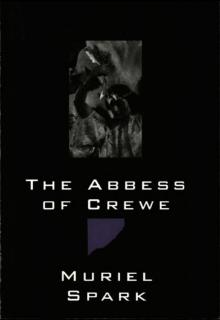 The Abbess of Crewe: A Modern Morality Tale
The Abbess of Crewe: A Modern Morality Tale Reality and Dreams
Reality and Dreams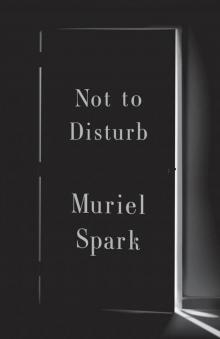 Not to Disturb
Not to Disturb The Prime of Miss Jean Brodie
The Prime of Miss Jean Brodie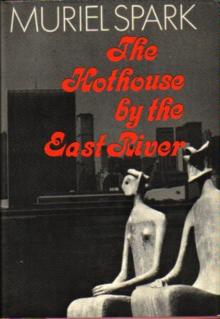 The Hothouse by the East River
The Hothouse by the East River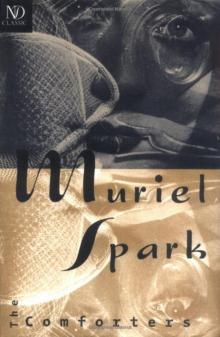 The Comforters
The Comforters (1958) Robinson
(1958) Robinson Unknown
Unknown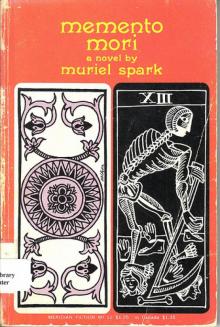 Memento Mori
Memento Mori The Finishing School
The Finishing School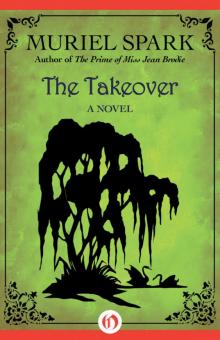 The Takeover
The Takeover Territorial Rights
Territorial Rights The Complete Short Stories
The Complete Short Stories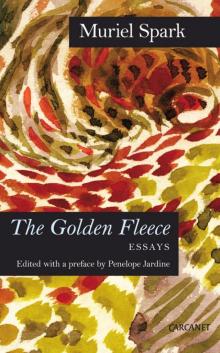 The Golden Fleece: Essays
The Golden Fleece: Essays The Ballad of Peckham Rye
The Ballad of Peckham Rye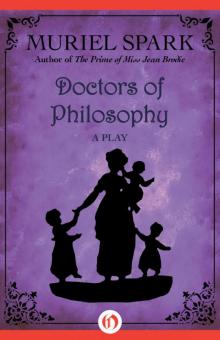 Doctors of Philosophy: A Play
Doctors of Philosophy: A Play The Mandelbaum Gate
The Mandelbaum Gate Loitering With Intent
Loitering With Intent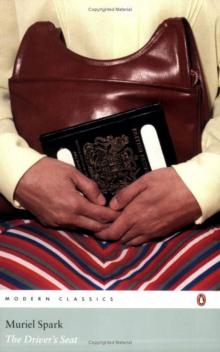 The Driver's Seat
The Driver's Seat Complete Poems: Muriel Spark
Complete Poems: Muriel Spark Symposium
Symposium Aiding and Abetting
Aiding and Abetting The Golden Fleece
The Golden Fleece The Girls of Slender Means
The Girls of Slender Means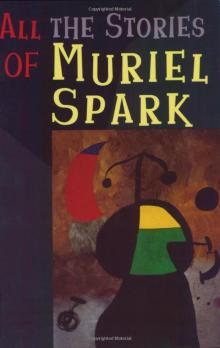 Alice Long’s Dachshunds
Alice Long’s Dachshunds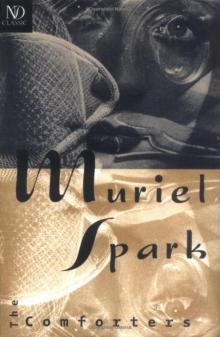 (1954) The Comforters
(1954) The Comforters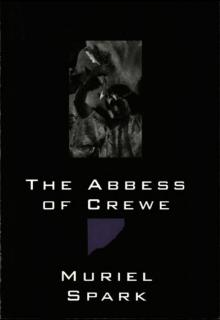 The Abbess of Crewe
The Abbess of Crewe Curriculum Vitae
Curriculum Vitae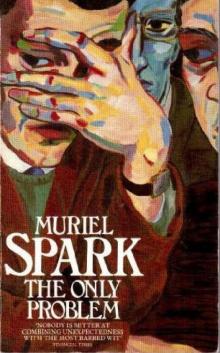 The Only Problem
The Only Problem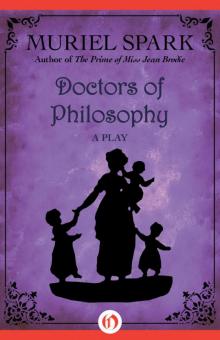 Doctors of Philosophy
Doctors of Philosophy